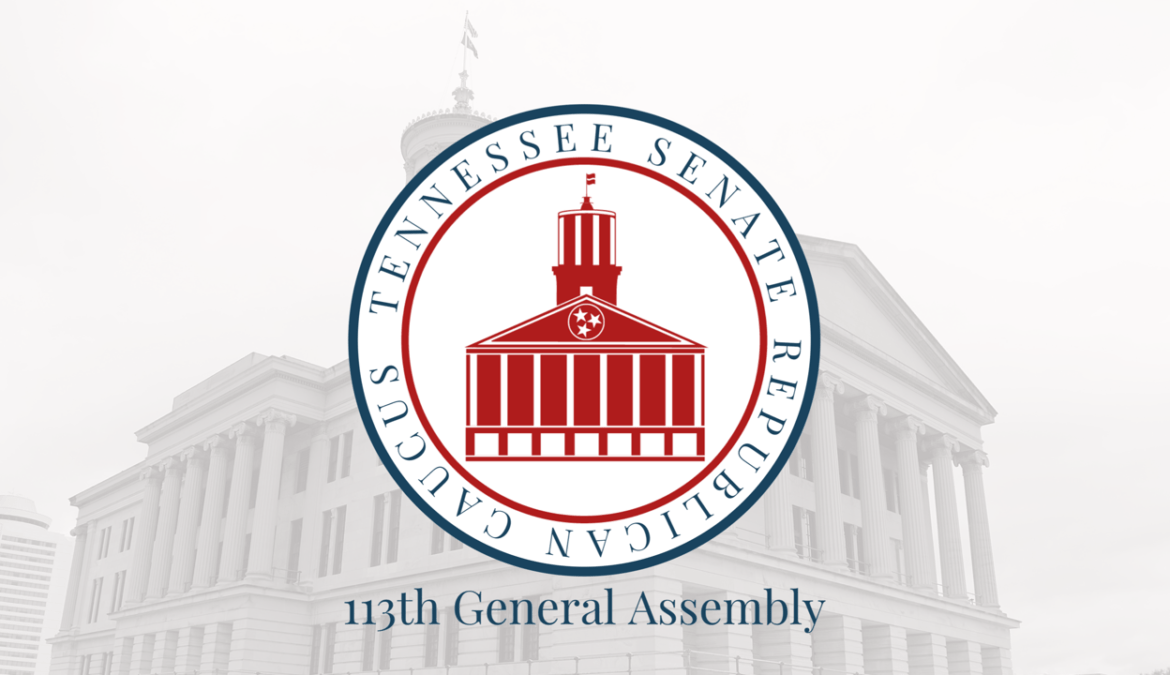(NASHVILLE) February 23, 2024, This week, the Senate advanced three proposals aimed at amending the Tennessee Constitution.
Giving judges more discretion to deny bail for violent crimes
Republicans in the Senate Judiciary Committee approved a new proposal from Senate Majority Leader Jack Johnson (R-Franklin) to expand judges’ ability to deny bail for certain violent crimes when it is in the best interest of public safety. Current law limits judges’ ability to deny bail to first-degree murder charges. If ratified by voters, Senate Joint Resolution 919 would allow judges to deny bail for those charged with violent offenses of terrorism, second-degree murder, aggravated rape and grave torture. It would also allow judges to deny bail for violent offenses that would require the defendant, if convicted, to serve at least 85 percent of their entire sentence under the state’s Truth in Sentencing law.
“Expanding the option for a judge to deny bail for violent offenders will help maintain law and order by demonstrating that acts of violence will be met with strict consequences and accountability,” said Johnson. “It will also help protect victims and the general public by keeping certain defendants who pose a threat to others in police custody. Judges should be able to use their discretion to make these decisions in the best interest of their communities.”
Under the measure, judges could only deny bail when the proof is evident, or the presumption of guilt is great. It also would require judges to place into the record the reason for denying bail.
The resolution now advances to the Senate floor to be read and voted on by the full Senate.
Prohibiting a state property tax
The Judiciary Committee also advanced another proposed constitutional amendment which would prohibit a state property tax. Tennessee has not had a state property tax since 1949, and House Joint Resolution 81, sponsored by Sen. Frank Niceley (R-Strawberry Plains) seeks to ensure that one can never be implemented by a future General Assembly.
“Tennessee used to operate solely with a state property tax and had no sales tax,” said Niceley. “That changed in 1949, when Governor McWherter helped pass a state sales tax for education and reduced the state property tax to zero. This constitutional amendment would protect Tennessee taxpayers by entirely eliminating the option for a state property tax to ever be imposed on Tennesseans again.”
The resolution was passed by the House of Representatives in the 2023 legislative session. It now advances to the Senate floor to be considered by the full Senate for the first time.
Marsy’s Law
A constitutional amendment to guarantee victims of crime have clear and enforceable rights passed the full senate this week to fulfill the first of two required passages before going to voters. House Joint Resolution 94, sponsored by Sen. John Stevens (R-Huntingdon) would add Marsy’s Law to the Tennessee Constitution to support crime victims and prevent further trauma. It aims to give constitutional protections to victims, including the right to be heard, the right to be informed, and the right to be treated with fairness, dignity, and respect through the judicial process.
The resolution was passed by the House of Representatives in the 2023 legislative session.
In order to ratify the constitution, a constitutional amendment must pass the general assembly twice. The first time it must pass with a simple majority voting in favor. The second time it must pass the next General Assembly by a two-thirds majority. Finally, the amendment would become part of the state constitution if the number of yes votes are equal to a majority of the total votes in the gubernatorial election.
Removing vaccine requirements for families that adopt and foster children
This week, the Senate Judiciary Committee advanced legislation aimed at increasing the number of Tennessee families eligible to adopt and foster children. It safeguards the rights of families to adopt or foster without facing mandates regarding specific vaccinations.
Senate Bill 2359, sponsored by Senator Bo Watson (R-Hixson), prohibits the Department of Children’s Services from mandating certain vaccines as a condition of adopting or caring for a foster child. The bill eliminates discrimination while also providing more children with homes in Tennessee.
“The current law disqualifies families from fostering and/or adopting a child in state care based on their immunization status, which is discriminatory and unfair,” said Watson. “We should encourage not hinder good, loving families who desire to foster and/or adopt these babies. This legislation reflects Tennessee’s core family values and commitment to ensuring children have the chance to thrive in a supportive family environment.
The bill passed the Senate Judiciary Committee and awaits final consideration by the full Senate.
Lawmakers seek to prohibit taxpayer-funded ransomware payments
A Republican proposal advanced in the Senate State and Local Government Committee this week which would ensure taxpayer funds are not on the hook for ransom payments to cyber criminals holding sensitive and private data hostage.
Senate Bill 1825, sponsored by Senator Bo Watson (R-Hixson), would prohibit all state entities from contracting, negotiating with or paying an individual or entity that is a known system hacker. The proposed legislation instructs state entities to immediately notify and consult with the Tennessee Bureau of Investigation in the case of a cyber-attack.
“This legislation will put cyber criminals on notice to not target Tennessee,” said Watson. “Not only is it bad economic practice to pay ransom to cyber attackers, but it also emboldens criminals and encourages further abuse.”
Cybercriminals have increasingly targeted U.S. federal and state government agencies around the nation in recent years, attacking critical emergency alert systems and stealing citizens’ private data. The disruptions are costly and recovery of data is challenging.
Ransomware is a type of malware designed to encrypt files on a device or computer, rendering them and their connected systems unusable, according to the Cybersecurity and Infrastructure Security Agency (CISA), an arm of the U.S. Department of Homeland Security. The agency launched stopransomeware.gov in 2023 to help organizations reduce their risk of ransomware.
Legislation advances to hold parents accountable for child’s delinquent actions
Senator Brent Taylor (R-Memphis) is sponsoring the Parent Accountability Act aimed at creating accountability for parents with delinquent children. Under the legislation, judges would have the discretion to fine parents or guardians instead of the child for their delinquent actions after their first offense.
“This bill is designed to incentivize parents to pay closer attention to their children,” said Taylor. “This restitution order could help prevent more victims of crimes because of parents taking more control of their kids.”
If the parent is unable to pay the fine, community service is an alternative option. Senate Bill 2571 passed the Senate Judiciary Committee this week and advances to the Senate Finance Committee.
Increasing transparency in juvenile courts
Senator Page Walley (R-Savannah) is sponsoring legislation that promotes more transparency in the juvenile court system. Senate Bill 2059 requires the Administrative Office of the Courts to submit reports on juvenile courts that are noncompliant with statewide data collection requirements. These annual reports would list each court that is not in compliance, the date of the noncompliance, and what could be done for the court to be back in compliance.
“It’s important for the legislature, the Department of Children’s Services, and all of us that seek to provide resources and manage these kinds of situations to know what is really happening,” said Walley. “This will help encourage compliance with data reporting and ensure we have the most accurate data regarding delinquency offenses across the state.”
The bill passed the Senate Judiciary Committee on Tuesday and awaits final consideration from the full Senate.
Legislation to prohibit political flags in classrooms advances
A Republican bill to keep controversial or political flags out of the classroom advanced out of the Senate Education Committee this week.
Senate Bill 1722, sponsored by Senator Joey Hensley (R-Hohenwald) would prohibit certain flags from being displayed in public schools.
“At public schools, students should be focused on learning academic skills and not be distracted by displays of political beliefs that might go against the values their parents are teaching at home. This legislation aims to keep political or controversial distractions out of the classroom by ensuring flags that espouse certain viewpoints or values are not displayed in school.”
The bill specifically lays out the flags that would be allowed to be displayed in schools such as those with local, state, national, world and historical significance. In addition to the Tennessee and United States flags, other flags that would be allowed include military flags, government flags, foreign country flags and flags used temporarily for course curriculums.
The legislation would also allow parents to take civil action against a school if it refuses to act within 10 days of receiving a written notice regarding a potential violation of the law. The bill now advances to the Senate floor for a vote by the full Senate.
Empowering parents in their child’s education: On Wednesday, the Senate Education Committee advanced legislation sponsored by Senator Adam Lowe (R-Calhoun) to empower parents to have the final say over education decisions for their child. Senate Bill 1688 allows parents and guardians to hold back their child from the next grade without the approval of the school board if their child has a learning or behavioral delay. The bill advances to the Senate floor for final consideration.
Protecting schools and preparing teachers: As school safety continues to be a top priority for Tennessee lawmakers, legislators are working hard to ensure all school staff, including substitute teachers, are equipped with the training necessary to protect their students. On Wednesday, the Senate Education Committee advanced SB 2652 sponsored by Senator Dawn White (R-Murfreesboro) which would require school safety training for incoming substitute teachers. The bill now moves forward for approval on the Senate floor.
Requiring carbon monoxide detectors in daycares: To ensure the safety of children in childcare facilities across Tennessee, Senator Paul Bailey (R-Sparta) is sponsoring legislation that would require childcare facilities in Tennessee to have carbon monoxide detectors installed in every room. The legislation follows an incident at a childcare facility that resulted in the building being evacuated due to high carbon monoxide levels. The facility did not have carbon monoxide detectors and many children were exposed to dangerous levels of carbon monoxide. Senate Bill 2066 will help prevent similar incidents in the future and ensure children do not suffer the long-term effects of carbon monoxide poisoning. The bill passed the Senate Health and Welfare Committee and advances to the Senate floor for final consideration.
Reports of animal abuse: Senate Bill 1957, sponsored by Senator Ferrell Haile (R-Gallatin), will allow veterinarians in Tennessee to report suspected animal cruelty and testify in judicial proceedings regarding that animal’s care without violating veterinarian-client-patient confidentiality. A veterinarian would also have immunity from any breach of confidentiality under this legislation if they are acting in good faith reporting the suspected abuse. The bill awaits final consideration on the Senate floor.
Expediting development processes: Tennessee has experienced a construction boom in recent decades, since becoming such a popular destination for businesses and people to move. As a result, the construction permitting and inspection process is facing a significant backlog. To reduce development costs and streamline construction projects for Tennesseans, Senate Majority Leader Jack Johnson (R-Franklin) is sponsoring Senate Bill 2100 which would allow a third party examiner, inspector, engineer, or professional to inspect certain processes. Currently, all processes must be inspected by a state or local examiner, which delays construction projects when none are available. The bill passed Commerce and Labor on Tuesday and now awaits approval on the Senate floor.
Print Disability Absentee Voting Act: In an effort to increase voter participation among those with print disability, Senator Becky Massey (R-Knoxville) is sponsoring Senate Bill 2118 which will direct the coordinator of elections to make absentee ballots more accessible to voters who are blind and those with other print disabilities. Print disability is defined as a disability that interferes with a person’s ability to read, write, or use printed materials.
The Senate State and Local Government Committee heard testimony from an individual with print disability who described that due to his disability and accessibility of voting in Tennessee, he was not able to vote in private or keep his vote confidential. Every individual has the right to a private vote, and with the Print Disability Absentee Voting Act, individuals with print disability will have more access to privacy and confidentiality while voting.
Election integrity for administrator of elections: Senate Bill 1768, sponsored by Senator Jon Lundberg (R-Bristol), would impact an individual from serving as an administrator of elections in Tennessee who has a family member qualifying as a candidate for public office. The legislation would require an administrator of elections to temporarily step down from the position at least 30 days prior to an election if an immediate family member was on the ballot in the county they serve. The legislation passed the Senate State and Local Government Committee this week.
Social Work Licensure Compact: To increase access to quality social workers, Senator Page Walley (R-Savannah) is sponsoring Senate Bill 2134 to establish the Social Work Licensure Compact. The legislation, which passed the Senate Government Operations Committee this week, seeks to enable social workers who are qualified to work in other states participating in the compact to work in Tennessee. Two states have already ratified the Compact. This legislation puts the framework in place for the compact to go into effect when seven states ratify the Compact.
Support for parents: On Tuesday, the Senate Judiciary Committee advanced legislation sponsored by Senator Ferrell Haile (R-Gallatin) that would expand parents’ right to video call their child when in the custody of the other parent. Senate Bill 2744 ensures parents get face-to-face contact with their child at least twice a week according to their parenting plan. This bill advances to the Senate floor.
Support for development districts – Legislation sponsored by Senator Ken Yager (R-Kingston) would increase funding to the nine development districts across Tennessee. These development districts have many responsibilities, some of which include planning functions for rural counties and promoting economic development. Senate Bill 2341 advanced out of the Senate State and Local Government Committee to the Senate Finance Committee.
Advocacy for children with trauma: Legislation sponsored by Senator Ferrell Haile (R-Gallatin) would allow courts to add trauma-informed education as a requirement in a parenting plan when children have been removed from their homes in cases of dependency or neglect.
“Children that have experienced trauma can suffer from learning problems, lower grades and a variety of other problems,” said Sen. Haile. “This legislation will provide the necessary training to help children succeed in life.”
Senate Bill 613 passed the Judiciary Committee and advances to the Senate floor for final consideration.
Updates to Length of Service Reward Program: Senate Bill 2331, sponsored by Senator Ken Yager makes changes to the Length of Service Reward Program (LOSAP). LOSAP allows participating local governments to receive state matching funds to provide financial rewards to volunteer firefighters and EMS workers as a way to encourage, recognize and retain their service. The bill removed the directive to administer the LOSAP grant on a first come, first serve basis. This change will allow employers to receive a prorated amount of grant funding. The bill also allows Treasury to use the LOSAP grant funds to pay for the administrative expenses associated with the program to ensure that the program costs are covered without raising participant fees. The legislation awaits final consideration on the Senate floor.
Supporting emergency transport services for TennCare recipients: Senator Page Walley (R-Savannah) is sponsoring legislation that benefits rural ambulance service providers. Under Senate Bill 2168, TennCare will be required to reimburse an ambulance service provider servicing TennCare patients at a rate no less than 100% of the program’s allowable charge for participating providers. In addition, the bill adds that for-profit ambulance services are eligible to receive emergency medical services equipment grants. The bill moves to the Senate floor for final consideration.
Another bill, sponsored by Senator Paul Bailey (R-Sparta), will require TennCare to reimburse a public or private air ambulance service that bills for transports to TennCare recipients at a rate not less than 67.5% of the federal medicare program’s allowable charge for participating providers. Senate Bill 2921 also passed out of the Senate Health and Welfare Committee and moves to the Senate Finance Committee.
Bills previously covered that passed the Senate floor this week:
- Senate Bill 287, sponsored by Senator Ferrell Haile (R-Gallatin), adds the offense of statutory rape by an authority figure to the existing list of 13 offenses under the solicitation of a minor statute.
- Senate Bill 1681, sponsored by Senator Page Walley (R-Savannah), clarifies that local law enforcement agencies and local courts must be informed when a patient who lives in their jurisdiction is released from a psychiatric institution.
- Senate Bill 1711, sponsored by Senator Joey Hensley (R-Hohenwald), directs public K-12 schools and higher education institutions to adopt policies regarding the use of AI for students and staff for the 2024-2025 school year.
- Also by Senator Hensley, Senate Bill 1712 creates a mathematics expert review committee to evaluate and report on the landscape of mathematics instruction in Tennessee as well as identify professional development options available to improve instruction and student proficiency.
- Senate Bill 1968, sponsored by Senator Richard Briggs (R-Knoxville), prevents a person from running for two elected offices at the same time.
- SJR 870, sponsored by Senator Hensley, condemns the terrorist attacks Israel suffered on October 7, 2023.
###



